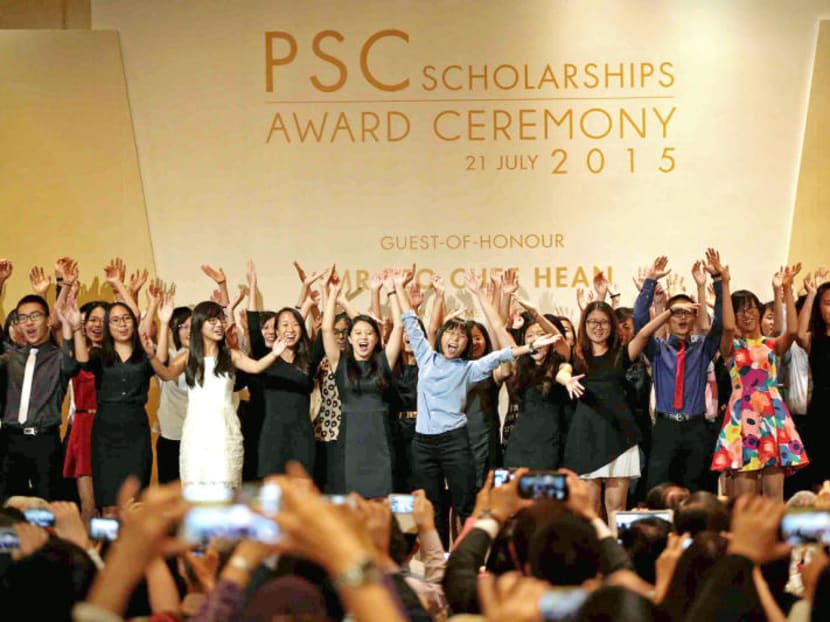New tests useful, but important to maximise diverse attributes, say scholars and public servants
SINGAPORE — While new tests can capture more attributes of potential scholars, the Public Service Commission (PSC) needs to interpret the results carefully and place public servants in roles that maximise a diverse range of attributes, said recipients of government scholarships.

Some scholars suggested moving away from the perceived prestige of PSC scholarships or offering them to mid-career individuals.
SINGAPORE — While new tests can capture more attributes of potential scholars, the Public Service Commission (PSC) needs to interpret the results carefully and place public servants in roles that maximise a diverse range of attributes, said recipients of government scholarships.
They were weighing in on PSC chairman Lee Tzu Yang’s open letter on Wednesday (Oct 31). Among other things, Mr Lee said the commission will encourage diversity in the scholars’ choice of courses and countries of study, and explore tools such as game-based assessments to assess attributes such as perseverance.
Ex-civil servant and government scholarship holder Hoe Yeen Teck, 38, said he understands the games-based assessments to include group assessments that allow assessors to evaluate how candidates interact with one another in different scenarios.
Such assessments are useful, but results need to be interpreted with care.
“A common observation of group assessments is that candidates who aren’t as articulate tend not to do as well. So there is a risk that candidates from less privileged backgrounds may be disadvantaged if they aren't as at ease in social situations,” said Mr Hoe.
“That said, it's always useful to have more data points.”
The deployment of new tools will show that the PSC is keeping up with the times, said a PSC scholar in his 20s who declined to be named. He welcomed the use of practical assessments as well as more options being made available to scholars.
Mr Lee said in his letter that the PSC would encourage scholars who may want to pursue postgraduate studies in China or take a gap year at a start-up in Indonesia.
There are government scholars who get exposed to other opportunities when they venture abroad for studies, and decide to break their bond, the PSC scholar noted. This is one area the PSC can consider improving, he said.
Allowing scholars to take a gap year could go both ways, said another former civil servant. “Some may like what they’re doing so much and decide to leave for good, while others may satisfy their curiosity and then decide that public service is still better,” he said.
It is equally important to place individuals in roles that leverage their strengths — for example, placing those with an appetite for risk in an economic agency instead of foreign affairs, he said.
To take the “many paths to success” notion even further, some awardees suggested moving away from the perceived prestige of PSC scholarships or offering them to mid-career individuals.
“Because of the perceived prestige of the PSC scholarships, which PSC often touts, it is not uncommon for students to view obtaining a scholarship as an extension of the competition they face in school,” said Mr Hoe. “The PSC then has to face an additional challenge of separating those who truly want to serve from those who just want another trophy.”
MORE REALISTIC SETTING FOR TESTS?
Observers welcomed the direction that Mr Lee laid out and said the initiatives will take time to bear fruit.
“The direction that Tzu Yang has indicated is absolutely correct. The civil service certainly ought to be far more diverse and under its new head, Leo Yip, has been moving in that direction,” said Mr Bilahari Kausikan, a retired diplomat and former permanent secretary at the Ministry of Foreign Affairs.
“But the innate conservatism of some of its institutions and senior members should not be underestimated. Tzu Yang and Leo will need strong political and public support to realise their vision,” he added.
Singapore Management University law professor Eugene Tan noted that Mr Lee addressed issues of topical concern such as meritocracy and diversity. The public service culture has to adapt to changing societal conditions and reflect the evolving diversity and needs of the people it serves, said Associate Professor Tan, a former Nominated Member of Parliament (NMP).
Mr Devadas Krishnadas, chief executive of management consultancy Future Moves, said scholarships are a powerful tool for social mobility and inclusiveness.
“It is timely that the civil service recognises the opportunity to catalyse the potential of deserving candidates from a broad socio-economic spectrum and across the ethnicities,” he said.
Former NMP Viswa Sadasivan said that for tests to be accurate enough, applicants need to be put in a realistic setting over a period of time.
In this way, “the layers that are used to protect them are shed and their primordial instincts will surface, so that their values like integrity and empathy can be evaluated”, said the founder of Strategic Moves, a strategic and crisis communications consulting practice.
“No matter how many psychometric tests or game-based assessments, if they are in an air-conditioned setting, you are not going to get the true nature of the person,” he said.
“In the military, you can do war-gaming exercises or tabletop exercises in an air-conditioned setting. But the real test is when you do a five-day mission exercise in extremely difficult weather, where you are short of sleep, where you have to cross the river, you are exhausted, and in such conditions, you are required to make tough decision calls… that's where you can see (who) is truly a team player.”








